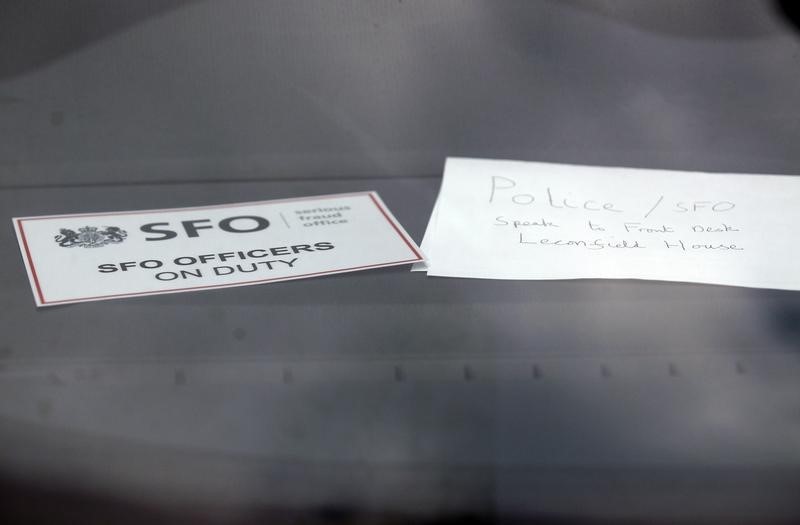By Huw Jones and Jamie McGeever
LONDON (Reuters) - Britain's fraud watchdog has ended an investigation into possible foreign exchange market rigging, saying it did not have enough evidence to secure convictions, in a further setback to its efforts to prosecute wrongdoers in financial markets.
Some of the world's biggest banks have been fined billions of dollars for trying to manipulate foreign exchange rates after a global probe into the $5 trillion a day market.
So far no individual traders have not been prosecuted.
The investigation by the Serious Fraud Office began in July 2014 after material was passed to it by Britain's Financial Conduct Authority. The SFO was one of several authorities around the world to investigate alleged forex market manipulation. An inquiry by the U.S. Department of Justice is continuing.
The investigation by the Serious Fraud Office began in July 2014 after material was passed to it by Britain's Financial Conduct Authority. The SFO was conducting one of several probes around the world into the alleged forex market manipulation.
The SFO said on Tuesday that based on the information and material obtained, there was insufficient evidence for a realistic prospect of conviction.
The SFO, which investigates and prosecutes major and multi-national fraud, bribery and corruption, said its decision followed an independent investigation lasting more than one and a half years and involving over half a million documents.
It said it continued to liaise with the DOJ over its ongoing investigation.
The SFO's decision follows the acquittal earlier this year in a trial brought by the SFO of six former brokers accused of conspiring with Tom Hayes to manipulate the Libor benchmark interest rate.
Hayes was found guilty last August of conspiring to rig Libor and was jailed.
"Coming hot on the heels of the recent Libor verdict this will be embarrassing for the SFO," Alison McHaffie, a regulatory partner with law firm CMS, said.
"However it does show the difficult job the SFO has in demonstrating criminal activity by individuals for this type of market misconduct."
Authorities were first alerted to alleged collusion between currency traders setting benchmark exchange rates at the 4:00 pm daily "London fixing" in mid-2013.
The subsequent investigations by regulators around the world, principally in the United States and Britain, led to dozens of traders being suspended or fired, new codes of conduct drawn up and some of the world's biggest banks fined more than $10 billion collectively.
The probes centred largely on millions of electronic chatroom communications between groups of FX traders at banks who routinely shared intelligence on orders they were about to place for clients.
Many of the traders who were fired during the investigation are now suing their former employers for unfair dismissal. Perry Stimpson won his case against Citi in London last November.
Ben Rose, a partner at law firm Hickman and Rose, said the SFO's decision suggested it was pulling back from prosecuting cases linked to financial benchmarks.
"This decision follows the sweeping acquittals of six brokers in the recent Libor trial. It suggests that the SFO is losing its appetite for risk and that the Hayes verdict may be the high water mark for these prosecutions."
